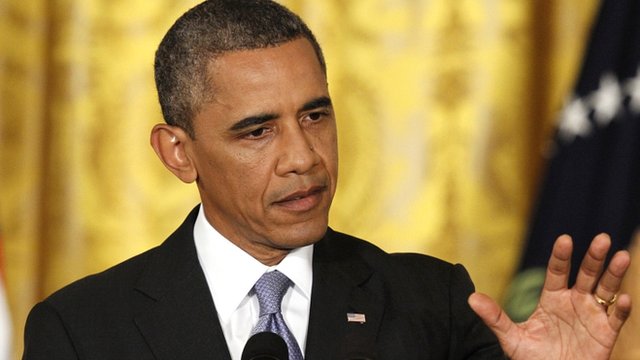
- President Barack Obama: "The American people need to have confidence in these programmes"
- _69211383_obamaap.jpg (36.78 KiB) Viewed 6369 times
9 August 2013 Last updated at 23:55 GMT
Barack Obama pledges greater surveillance transparency
President Barack Obama has promised "appropriate reforms" to guarantee greater oversight of controversial US surveillance programmes.
At a White House news conference, he proposed "safeguards against abuse", including amending legislation on the collection of telephone data.
Mr Obama also urged appointing a lawyer to challenge the government at the nation's secretive surveillance court.
He has been defending the programmes since they were leaked in June.
Snowden 'no patriot'
Mr Obama said on Friday that the US "can and must be more transparent" about its snooping on phone and internet data.
"Given the history of abuse by governments, it's right to ask questions about surveillance, particularly as technology is reshaping every aspect of our lives," he told reporters.
"It's not enough for me as president to have confidence in these programmes," Mr Obama added. "The American people need to have confidence as well."
The president unveiled four proposals aimed at reassuring the public:
Reform Section 215 of the Patriot Act, which governs the programme that collects telephone records
Declassify the legal rationale for the government's phone-data collection, and said the National Security Agency would put in place a "civil liberties and privacy officer"
Appoint a lawyer to argue against the government at the Foreign Intelligence Surveillance Court, which is accused of essentially rubber-stamping official requests to scour electronic records
Form a group of external experts to review all US government intelligence and communications technologies
In response to a question about Edward Snowden, the former NSA contractor who leaked details of the surveillance programmes to media, Mr Obama said: "No, I don't think Mr Snowden was a patriot."
'Cold War stereotypes'
The president went on to criticise Russia, which recently granted asylum to Mr Snowden. Earlier in the week, Mr Obama cancelled a planned summit with President Vladimir Putin next month in Moscow.
Mr Obama said there had been more anti-American rhetoric since Mr Putin returned to the Russian presidency, which "played into some of the old stereotypes about the Cold War contest".
I've encouraged Mr Putin to think forward as opposed to backwards on those issues, with mixed success," said Mr Obama.
He said that during his public interaction with Mr Putin, the Russian leader "has got that kind of slouch, looking like he's the bored kid in the back of the classroom". But he said their discussions in private had been constructive.
Mr Obama also said he would not consider it "appropriate" to boycott Russia's Winter Olympics next year, despite calls by gay rights activists to shun the Sochi games because of a recently passed law in that country banning "homosexual propaganda".
He said the best way to combat the law was for gay and lesbian athletes to do well in the games.
"One of the things I'm really looking forward to is maybe some gay and lesbian athletes bringing home the gold or silver or bronze, which would, I think, go a long way in rejecting the kind of attitudes that we're seeing there," he said.
"And if Russia doesn't have gay or lesbian athletes, then, it'll probably make their team weaker."
Earlier on Friday, Secretary of State John Kerry and Defence Secretary Chuck Hagel held talks with their Russian counterparts in Washington DC.
Mr Kerry conceded the US-Russia relationship had been complicated by "the occasional collision" and "challenging moments".
Russian Foreign Minister Sergei Lavrov also acknowledged problems, but said Moscow preferred to handle their differences like "grown-ups".
The two countries agreed on the need to convene a Syrian peace conference in Geneva, Switzerland, as soon as possible.